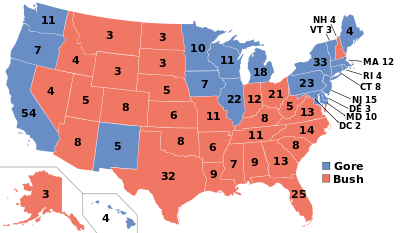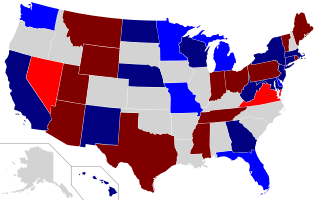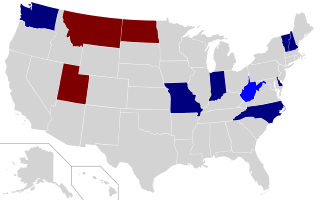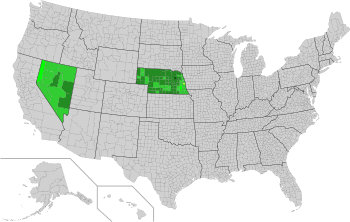United States elections, 2000
| |
| |
|---|---|---|
| President | Democratic | Republican |
| House | Republican | Republican |
| Senate | Republican | Republican |
The 2000 United States elections were held on November 7, 2000.
President

In the 2000 presidential election, Republican Texas Governor George W. Bush defeated Democratic incumbent Vice President Al Gore. The election was eye-catchingly close, but was the third straight election where neither party won a majority of the popular vote. [1]
United States House of Representatives
Republicans lost two seats in the House, while Democrats gained 1 seat and 1 independent, Virgil Goode, was elected. Following the 2000 election, the majority of the House seaters in the South and Midwest were held by the Republican party, while the larger number of seats in the Northeast and West were held by the Democratic party. [2]
United States Senate

The 33 seats in the United States Senate Class 1 were up for election plus one special election. The Senate became split 50-50 until 2001 when Senator Jim Jeffords left the Republican Party and caucused with the Democrats.

Six senators were defeated in the November 2000 election. The five defeated Republicans included Spencer Abraham of Michigan, John Ashcroft of Missouri, Slade Gorton of Washington, Rod Grams of Minnesota, and William V. Roth of Delaware. The single defeated Democrat was Charles S. Robb of Virginia. [3]
Governors
One sitting governor was defeated in the November 2000 general election. Cecil H. Underwood, Republican of West Virginia, concluded the 2000 election with a 47.2 election percentage. Bob Wise, Democrat, was elected to a four-year term. [4]
Local elections
Mayoral elections
Some of the major American cities that held their mayoral elections in 2000 included:
- San Diego – Superior Court Judge Dick Murphy (R) was elected to a first term as mayor.[5]
Initiatives and Referenda

- State constitutional amendments prohibiting same-sex marriage and civil unions is passed in Nebraska and Nevada passes constitutional ban on same-sex marriage only, but it doesn't go into effect because the Nevada Constitution requires two ballot votes for citizen-initiated constitutional amendments.
References
- ↑ Scammon, Richard M., Alice V. McGillivray, and Rhodes Cook. America Votes 24: A Handbook of Contemporary American Election Statistics, 2000. Washington, D.C.: CQ, 2001. Print.
- ↑ Scammon, Richard M., Alice V. McGillivray, and Rhodes Cook. America Votes 24: A Handbook of Contemporary American Election Statistics, 2000. Washington, D.C.: CQ, 2001. Print.
- ↑ Scammon, Richard M., Alice V. McGillivray, and Rhodes Cook. America Votes 24: A Handbook of Contemporary American Election Statistics, 2000. Washington, D.C.: CQ, 2001. Print.
- ↑ Scammon, Richard M., Alice V. McGillivray, and Rhodes Cook. America Votes 24: A Handbook of Contemporary American Election Statistics, 2000. Washington, D.C.: CQ, 2001. Print.
- ↑ Perry, Tony (November 9, 2000). "San Diego Winner Puts Ethics Panel on Agenda". Los Angeles Times. Retrieved October 19, 2014.
External links
- United States Election 2000 Web Archive from the U.S. Library of Congress